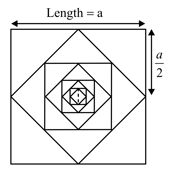MEDIUM
Earn 100
The sum of the sequence $ \text{S}=\frac{1}{3}+\frac{1}{{3}^{2}}+\frac{1}{{3}^{3}}+\dots +\frac{1}{{3}^{\text{n}}}$, is given by S = $ \frac{r\left(1-{r}^{\text{n}}\right)}{1-r}$ , where $ r=\frac{1}{3}$ and $ n$ is the number of terms in the sequence.
What is the sum of the sequence $ \frac{1}{3}+\frac{1}{{3}^{2}}+\frac{1}{{3}^{3}}+\frac{1}{{3}^{4}}$?
(a)$ \frac{{3}^{4}-1}{2\times {3}^{4}}$
(b)$ \frac{1-{3}^{4}}{2\times {3}^{4}}$
(c)$ \frac{{3}^{3}-1}{2\times {3}^{3}}$
(d)$ \frac{{3}^{4}-1}{{3}^{4}}$
50% studentsanswered this correctly
Important Questions on Sequences and Series
MEDIUM
MEDIUM
HARD
Let be the sum of areas of the squares whose sides are parallel to coordinate axes. Let be the sum of areas of the slanted squares as shown in the figure. Then is

MEDIUM
HARD
MEDIUM
MEDIUM
MEDIUM
EASY
HARD
(Here, the inverse trigonometric functions assume values in
respectively.)
MEDIUM
MEDIUM
MEDIUM
EASY
MEDIUM
HARD
If is the of two distinct real numbers and and are three geometric means between , then equals

